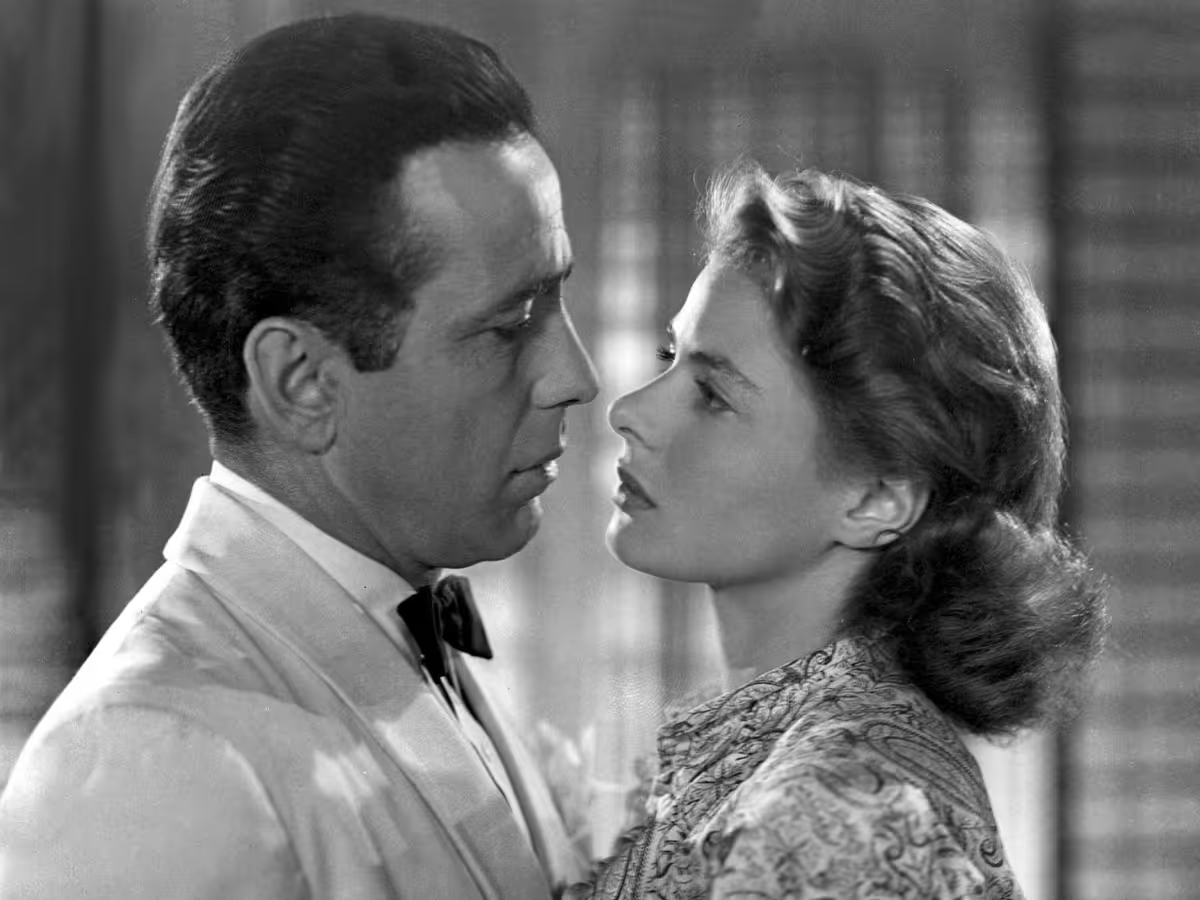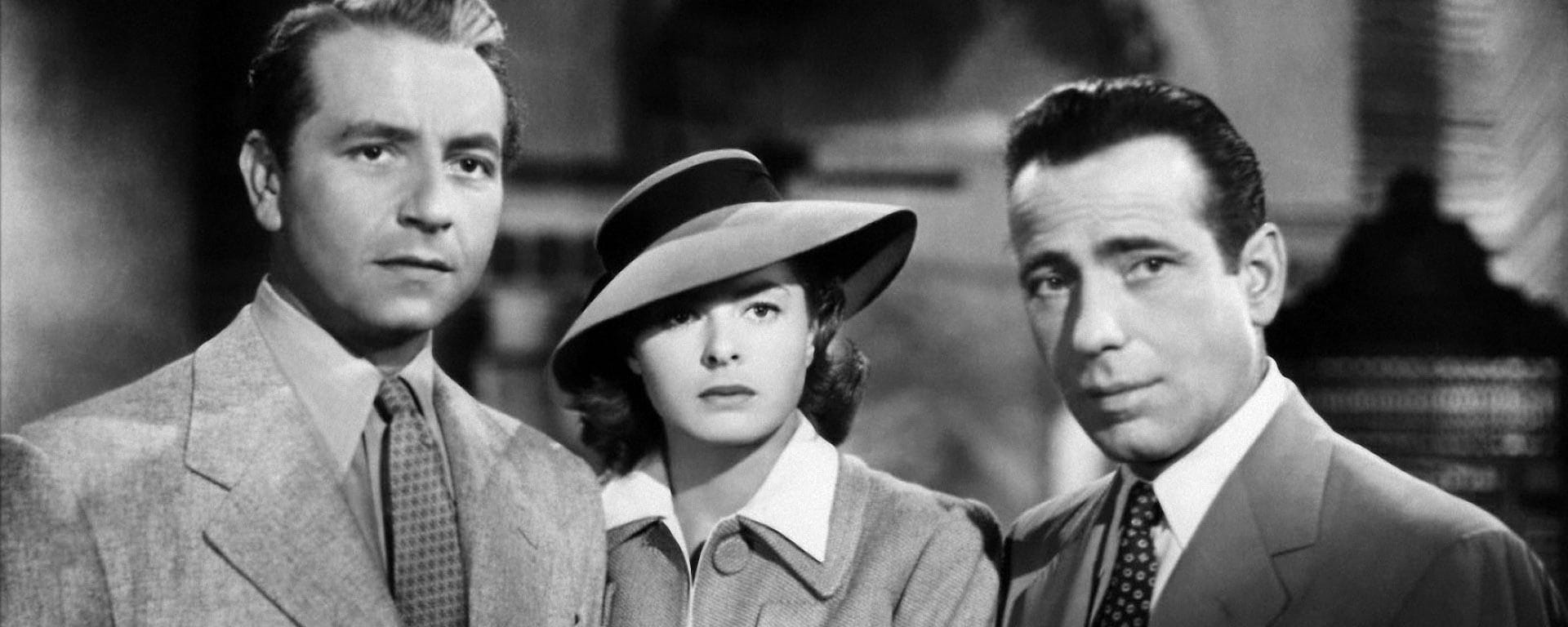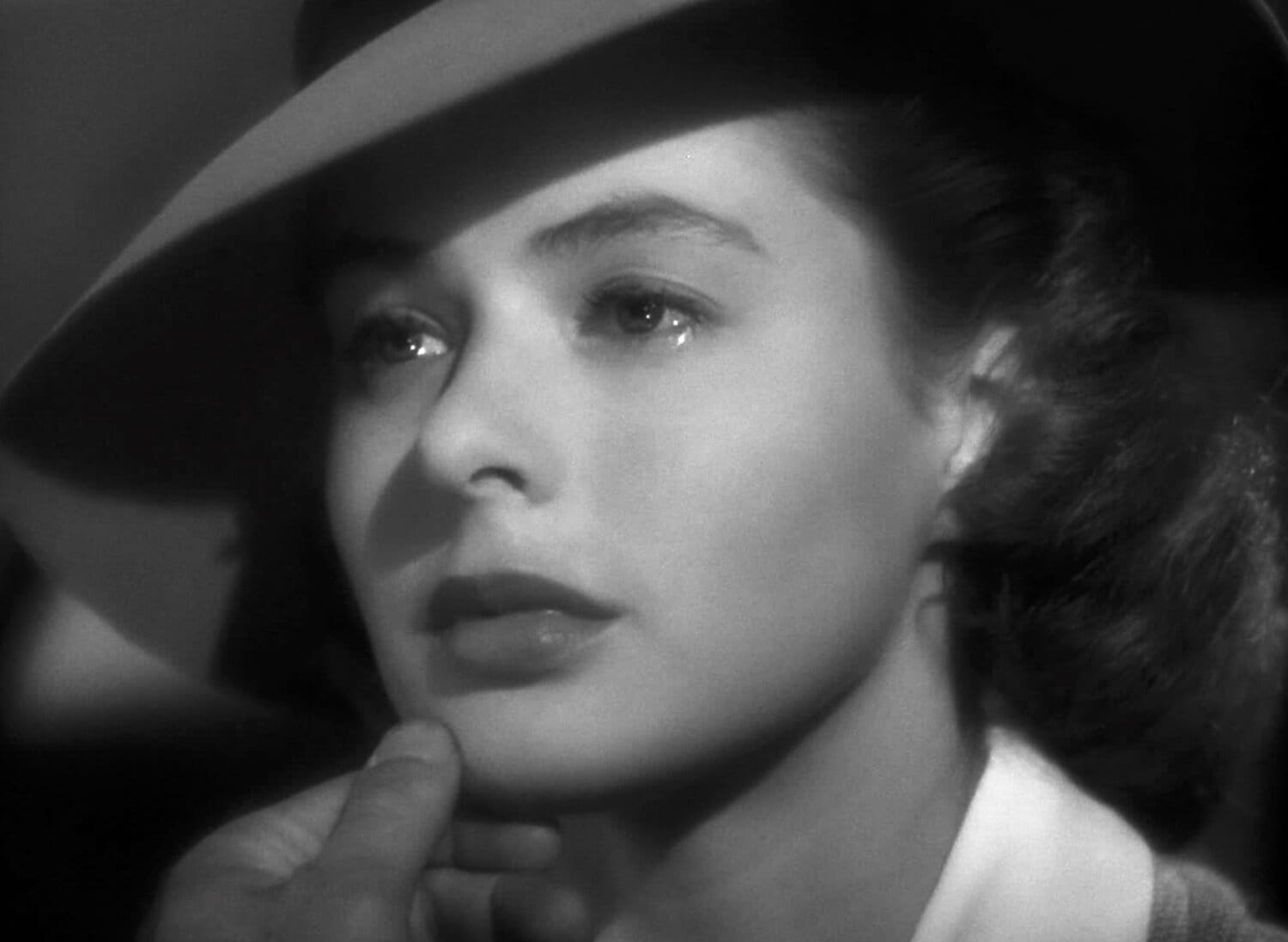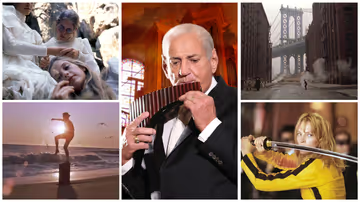#63 (tie): 'Casablanca': The Reveal discusses all 100 of Sight & Sound's Greatest Films of All Time
The sparkling jewel of the studio system has made audiences swoon for decades. We try to unpack what makes movie magic possible.

On December 1st, 2022, Sight & Sound magazine published “The Greatest Films of All Time,” a poll that’s been updated every 10 years since Bicycle Thieves topped the list in 1952. It is the closest thing movies have to a canon, with each edition reflecting the evolving taste of critics and changes in the culture at large. It’s also a nice checklist of essential cinema. Over the course of many weeks, months, and (likely) years, we’re running through the ranked list in reverse order and digging into the films as deep as we can. We hope you will take this journey with us.
Casablanca (1942)
Dir. Michael Curtiz
Ranking: #63 (tie)
Previous ranking: #83 (2012)
Premise: Casablanca: December, 1941. America has yet to enter World War II and the Moroccan city of Casablanca has swollen with refugees attempting to flee Europe. Many spend their evenings in Rick's Café Américain, a bustling nightspot owned by Rick Blaine (Humphrey Bogart). The place is open to all and Rick is vocal about his political neutrality,despite a past running guns and serving as a soldier-for-hire in the Second Italo-Ethiopian War and Spanish Civil War. Rick comes to possess two letters of transit that will allow those who carry them to leave Casablanca for Lisbon then flee to America. Then the two refugees for whom they were stolen arrive: Resistance leader Victor Laszlo (Paul Henreid) and his wife Ilsa Lund (Ingrid Bergman). But helping them would both endanger Rick’s standing in Casablanca and force him to take a side. Further complicating matters: he and Ilsa had a torrid affair in Paris that left Rick with a broken heart.
Keith: After rewatching Casablanca I did what I’ve made a habit of doing for these pieces and poked around the internet for interesting discussion points. One quickly arrived in the form of Ingrid Bergman’s 1978 appearance on The Dick Cavett Show where she discussed the making of the film. It’s one thing to read an account of the chaos behind the making of Casablanca, which is well-documented, but another to hear about it from one of the film’s stars. Per Bergman’s account, the question of whether Isla would end the film with Rick or Victor remained unresolved until late in the shoot and she was told to play the character as if she could go either way. The indecision made Bogart angry. He barely talked to anyone but Curtiz, and then mostly to yell at him. “We never knew what we were doing from one day to another,” Bergman says.
The Reveal is a reader-supported newsletter dedicated to bringing you great essays, reviews and conversation about movies. While both free and paid subscriptions are available, please consider a paid subscription to support our long-term sustainability.
But it’s Cavett’s description that sticks with me when he describes it as seeming “as worked-out as a Hitchcock film.” Casablanca has three credited screenwriters, Howard Koch and Julius and Philip Epstein. A fourth screenwriter, Casey Robinson, made major contributions and the story comes from an unproduced play written by Murray Burnett and Joan Alison. That’s a lot of cooks even before factoring in Curtiz and producer Hal Wallis. And yet Casablanca takes place in what feels like a fully realized world where Rick’s serves as a social center for a collection of lost souls and desperate characters. Some are displaced by war and history. Others seem like natural fits for such a place, like Peter Lorre’s doomed Signor Ugarte and the unnamed pickpocket (Curt Bois) who warns visitors against shady characters while relieving them of their wallets.
What’s more, the story doesn’t just work, every scene plays like the inevitable successor to the scene before, right up to the unforgettable finale. Sure, in theory you could have a version of this movie where Isla leaves Victor for Rick, but that version would say nothing about love and sacrifice where the final moments of this film say so much about those themes. One argument for this film’s reputation — and it’s notable that Casablanca only recently entered the Sight and Sound 100 and has climbed significantly since 2012 — is that it’s the epitome of Golden Age Hollywood achievement, a film in which the movie factory assembly line turned out an impeccable product. But it sounds like this could just as easily have been a studio Edsel. So is it best to look at Casablanca as the film industry at its peak or as the rare exception? And how much credit should belong to Curtiz, whose list of classics is formidable (to throw out just a few, The Sea Hawk, The Adventures of Robin Hood, Mildred Pierce, The Breaking Point)? Curtiz is usually cited as the exact opposite of an auteur: a craftsman hired to do a job.

Scott: I’ve always thought it was the prime example of the studio system working, but now that you’ve brought up the many ways in which Casablanca could have gone wrong, I wonder if the film is more a case of the stars coming into perfect alignment. One of the most popular alternate realities regarding Casablanca is the notion that Ronald Reagan was considered for the Bogart role, which has no basis in fact, but does serve as an interesting thought exercise because the film suddenly loses 99% of its magic just in that one little tweak. The actual fact that the love triangle wasn’t resolved until late into shooting is somehow more disturbing, because it makes you wonder how much the filmmakers understood what they were doing. Rick’s willingness to sacrifice himself not only brings nobility and soul to a character who’d suppressed those qualities within himself, but it’s more romantic. The best love stories tend to be the ones that don’t end happily, because that sense of loss clarifies the intensity of feeling these characters have for each other. Ending the movie with Rick and Isla bidding “bon chance” to a heartbroken resistance hero isn’t such a great feeling.
And yet, despite the what-might-have-been possibilities that could have turned Casablanca into mediocrity, maybe we should praise Curtiz and his writers for being the types of artists who would make the right decisions in the end. While the film stands out in the Sight & Sound poll for not being directed by an “auteur” type, Curtiz was a highly skilled studio hand with a number of fine films to his credit, which you noted above. The Epstein brothers were also talented and prolific writers–Arsenic and Old Lace is theirs–and Koch wrote Letter From an Unknown Woman, which is a gorgeous piece of work. And Robinson penned Now, Voyager. You don’t accidentally stumble into some of the most memorable dialogue ever written until you have a fair bit of talent. And this was a case where the right people were brought together for a handsome production that took perfect advantage of their alchemy. That’s the way the studio machine is supposed to work. It just doesn’t always work this well, which is why the greatest films tend to reflect a single director’s sensibility, rather than some miraculous lightning strike of collaborators.
But to focus on the film itself, I think the setting does so much of the work in establishing the high stakes of this love triangle and the external and internal tensions roiling within these characters. It may be a safe harbor of sorts, but it’s more like a waystation for people desperate to find their way to another place and a purgatory for someone like Rick, whose determined neutrality is both the cost of doing business and a self-imposed torment for a once-courageous idealist who’s now a lovelorn cynic. The city also reminds me a little of the post-war environment we got to explore a couple of months ago with The Third Man, which takes place in a Vienna where the new world order hasn’t asserted itself yet and so thieves and black market operatives have swept in to fill the vacuum. What a joy, for example, to see Peter Lorre breezing through the movie as Ugarte, the man with the letters of transit, who Rick seems to recognize as Casablanca’s equivalent to a businessman. And then there are all those naive strangers who can expect to have their wallets inspected. It’s not like the law is going to come down hard on them.
Then again, the law does have to come down hard when necessary to sustain itself. The relationship between Rick and Claude Rains’ Captain Renault ends with the single most famous last line in movie history but it begins with a beautiful synchronicity of purpose before getting to the beautiful friendship. Rick and Renault have a certain amount of power they can choose to exercise, but self-preservation is their primary objective, which means that they have to comply with the bellicose demands of someone like Major Strasser even when it’s obvious they don’t care for him at all. And for as much affection as Renault has for Rick, when Strasser orders him to shut down the nightclub when Rick allows a defiant rendition of the French national anthem to overwhelm the Germans, Renault does it without hesitation. (With another all-timer of a line about being “shocked” to discover gambling at this establishment.)
Keith, how does Ilsa fit into the world of Casablanca? What do you make of her feelings for Victor, which plainly don’t rival the passion she has for Rick, but doesn’t seem like a loveless union, either. What stands out to you about the style of Casablanca and what a director like Cortiz brings to the table? And, maybe most importantly, is there a single scene moment that sets the film apart for you. We may find better films than Casablanca on the Sight & Sound list, but is there one this widely beloved?

Keith: I think Ilsa, and Bergman’s performance, might be the element of the film that benefits the most from any indecisiveness as to how it would end. You’re right to suggest that she’s experienced a passion with Rick that she’d never experienced before and likely will never feel again. But do you ever get the feeling she doesn’t love Victor? And, just as relevantly, do you ever get the sense that Victor doesn’t deserve her love? It’s not that she loves one man and has no feelings for the other. It’s just that her feelings are complicated because grown-up love is complicated. That Casablanca acknowledges this and makes it a theme is part of what makes it great. In a film filled with remarkable lines, even verb tense matters. The choice of “have” in “We’ll always have Paris,” makes the past a living, present thing. But it’s still the past.
I can’t imagine anyone directing this film better than Curtiz. Maybe that’s because it’s a studio film and he was, by all accounts, happy to be a crucial part of the studio machine. I guess in some ways I’m an auteur skeptic. Or maybe an auteur heretic? I often take a director-first approach in thinking about films (I even arrange my movie collection by director) but I also never understood why hardcore auteurists never found room for the likes of Curtiz or, especially, Billy Wilder (but that’s a whole other discussion). I can’t necessarily point to visual signatures or thematic obsessions that run through Curtiz’s films — and I guess that’s, ha, sort of the point of auteurism — but boy could he direct a movie. What’s more, watch a Curtiz film and you know you’re in the hands of a great director. Casablanca creates a sense of a buzzling, dangerous, romantic world, but it’s also a film of intimate close-ups in which the space between characters seems positively charged. If Casablanca is, as you put it, the prime example of the studio system working, then few served that system better.
You ask for a single scene that stands out. That’s tough, but when I think of Casablanca, my mind immediately goes to Rick drunkenly flashing back to happier times. The film would probably work without that flashback — it’s a very good film, you know — but Rick and Ilsa’s happiness is so pronounced and so different from how they appear in the rest of the film that it makes the melancholy of their present state that much more palpable. But it’s not the flashback itself that sticks with me. It’s Rick wallowing in bitterness and regret and making his sadness look heroic. He’s not a cynic but a battered idealist. Casablanca is the story of how Rick learns to fight again — there were even (thankfully scrapped) plans for an epilogue showing Rick and Louis battling Nazis — but there’s a dark allure to this moment of hopelessness and surrender.
You can’t picture Reagan playing that scene. You can’t picture anyone else playing that scene. It’s probably the moment most responsible for the Bogart cult that sprung up after his death. (The Brattle Theater in Cambridge, MA served as its birthplace, but it spread.) So, Scott, what is it about Bogart that set him apart? And what about Casablanca showcases it so well? And here’s another thought exercise: If you could see a Casablanca spin-off built around another character, who would it be?
Scott: To me, Bogart embodies two seemingly contradictory qualities as an actor: cynicism and soul. We see those same qualities flourish later in Harrison Ford’s career, when he made pop-culture icons out of world-weary, reluctant heroes like Han Solo and Indiana Jones. Just thinking about other favorite Bogie roles—in films like The African Queen, In a Lonely Place, and Treasure of the Sierra Madre—you see a man scarred by experience and quick to sarcasm, but one with the embers of an idealist and a romantic still crackling under the surface. You feel like Rick can be relied upon in the end, but Bogart makes you feel the depth of his heartbreak, which he has managed by hiding out alone in this city that’s functioning as a waystation for misplaced souls.
The other basic thing about Bogart that’s relevant to Casablanca is that simply he has “It,” that otherworldly charisma that makes him a movie star worthy of another movie star like Ingrid Bergman. His magnetism as an individual, combined with the magnetism of he and Bergman as a couple, is one of those things the audience feels without needing much context for it. Paul Henreid is not exactly a drip as Victor, but I’m reminded a bit of the Ralph Bellamy characters in movies like The Awful Truth and His Girl Friday, in that there’s something about his earnestness that flattens him out as a romantic partner. While Victor isn’t quite at Bellamy’s level—he is a dashing resistance hero, after all—the feelings that Ilsa has for him aren’t comparable to the ones she has for Rick. Perhaps some of that is wrapped up in Victor’s heroic mission, which takes some sizable part of him that Ilsa alone can’t access. But it’s chemistry that makes the difference. Bogart is Bogart. You can’t love anyone else as much or in the same way.
But let’s credit Curtiz for making the absolute most of what he’s given here. I definitely do not want to wade into the auteur debate, other than to say that Curtiz doesn’t have the sort of stylistic signature that you could identify or rely upon. He’s more like the directorial version of Coen brothers composer Carter Burwell, who likened himself to a tailor fitting each film with an aural suit. That underplays Curtiz’s (and Burwell’s) artistry, because Casablanca provides so much visual support for these relationships, both in the look of locations like Rick’s and the airport tarmac in the end, and in the close-ups that sear themselves in your brain. While you would not describe the film as a noir, there are moments when the lighting had that kind of expressive emphasis, particularly on Rick, who’s inclined to slip permanently into the shadows.
I’m glad you asked the question about the Casablanca spin-off, because it gives me a chance to shine a light on a couple of the many memorable supporting performances in the film. The obvious choice here is a film built around Claude Rains as Captain Louis Renault, who’s having to navigate treacherous waters as the Vichy prefect who has to accommodate the Nazis but asserts his own decency when it matters. He has the funniest lines of the movie—he’s “shocked, shocked, to find that gambling is going on” at Rick’s and, at gunpoint, refers to his heart as his “least vulnerable spot”—so maybe a spin-off would be more wry comedy than policier. Alternatively, how about a prequel on Signor Ugarte, the petty criminal who smuggles the precious letters of transit into Rick’s before he’s gunned down? We can see from Ugarte and from the pickpockets around town that the city is rife with criminals looking to take advantage of the unique set of circumstances that bring people into town. Visitors to Casablanca have needs and vulnerabilities, and a guy like Ugarte can make a living. Plus, he’s played by Peter Lorre. Who wouldn’t want more of that?
Before checking out of this discussion, we should acknowledge that Casablanca has some of the best dialogue ever written. (Is this a testament to the power of writing by committee?!) There are so many lines here that leave you stunned at their wit or their evocative language: “The German wore gray, you wore blue.” “We’ll always have Paris.” “The problems of three little people don’t amount to a hill of beans in this crazy world.” (Though that one inevitably brings me to Frank Drebin in The Naked Gun saying, “But this is our hill and these are our beans.”) “It would take a miracle to get you out of Casablanca and the Germans have outlawed miracles.” And then, you know, one of the most quoted final lines in movies. I wonder if the filmmakers were confident at the time they were making one of the greatest films ever made or if Casablanca was just this magical moment of Hollywood serendipity. Either way, I’m happy Sight & Sound voters have swooned before it.
Speaking of swooning, we’ll get swept up again in doomed love for our next Sight & Sound entry, on Barry Jenkins’ Moonlight. Until then, here’s looking at you, Phipps.
Previously:
#95 (tie): Get Out
#95 (tie): The General
#95 (tie): Black Girl
#95 (tie): Tropical Malady
#95 (tie): Once Upon a Time in the West
#95 (tie): A Man Escaped
#90 (tie): Yi Yi
#90 (tie): Ugetsu
#90 (tie): The Earrings of Madame De…
#90 (tie): Parasite
#90 (tie): The Leopard
#88 (tie): The Shining
#88 (tie): Chungking Express
#85 (tie): Pierrot le Fou
#85 (tie): Blue Velvet
#85 (tie): The Spirit of the Beehive
#78 (tie): Histoire(s) du Cinéma
#78 (tie): A Matter of Life and Death
#78 (tie): Celine and Julie Go Boating
#78 (tie): Modern Times
#78 (tie): A Brighter Summer Day
#78 (tie): Sunset Boulevard
#78 (tie): Sátántangó
#75 (tie): Imitation of Life
#75 (tie): Spirited Away
#75 (tie): Sansho the Bailiff
#72 (tie): L’Avventura
#72 (tie): My Neighbor Totoro
#72 (tie): Journey to Italy
#67 (tie): Andrei Rublev
#67 (tie): The Gleaners and I
#67 (tie): The Red Shoes
#67 (tie): Metropolis
#67 (tie): La Jetée
#66: Touki Bouki
#63 (tie): The Third Man
#63 (tie): Goodfellas




Discussion